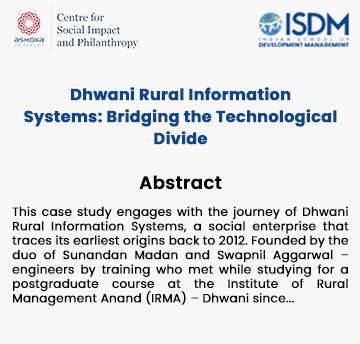Dhwani Rural Information Systems: Bridging the Technological Divide
This case study engages with the journey of Dhwani Rural Information Systems, a social enterprise that traces its earliest origins back to 2012. Founded by the duo of Sunandan Madan and Swapnil Aggarwal – engineers by training who met while studying for a postgraduate course at the Institute of Rural Management Anand (IRMA) – Dhwani since its inception has been trying to help a range of social sector organisations effectively integrate technology without disrupting the core ways in which these organisations work. Notably, it has been amongst one of the early enterprises in the sector which has taken efforts to understand in-depth the technology-related “pain points” common across organisations, and to bring a degree of standardisation to their solutions.
The case builds an appreciation towards the fact that at the core of a successful technology-centric social enterprise, which can offer relevant and affordable digital products and services to the sector, lies building a composite culture that can straddle both the developmental and technological landscapes. Such a culture seeks to combine engineering and consulting skills in equal measure, and seeks to solve problems mindful of the particularities of the developmental sector, while also retaining a service orientation. In particular, the case looks to draw attention to the ideas of hybridity and elasticity that are integral to such a culture and how these have to be sustained against continuous pressures of talent sourcing, compensation, retention, and learning and development.
In a short period of time, Dhwani has become a mature set-up with a clear sector-agnostic product and service value proposition to the sector, with a team strength of over 120 people and over 50 projects, and a variety of organisations, including nonprofits, philanthropies, CSR divisions and governments as clients. Therefore, the experiences of the founders and members of the team offer valuable lessons for other like-minded practitioners. At the same time, to researchers in the field of social enterprise the case may provide a more granular view of important aspects of culture-building in emerging social enterprises. The fact that such enterprises have to draw from a talent pool in constant competition with their private sector counterparts imparts added force to the above considerations.


